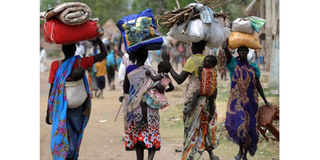Inside plan for women's political inclusion in S. Sudan

South Sudanese women.
What you need to know:
- The project, funded by the Peacebuilding Fund, will support capacity building and advocacy efforts for women's political participation.
- It will also tackle the barriers that undermine and keep women, especially young women, at the margins of decision-making, political leadership, and participation.
The UN Women and UNDP in South Sudan have launched a three-year programme to enhance women's political participation and leadership.
The project, funded by the Peacebuilding Fund, will support capacity building and advocacy efforts for women's political participation.
It will also tackle the barriers that undermine and keep women, especially young women, at the margins of decision-making, political leadership, and participation.
The project, to be implemented in Juba, Malakal and Pibor, will have technical leadership and strategic oversight provided by the Ministry of Peacebuilding.
During the launch, Mary Nawai, the Minister of Parliamentary Affairs, called on stakeholders to leverage the gains from similar projects to support capacity-building and advocacy efforts.
UN Women Country Representative Peterson Magoola stated that South Sudan is at a critical juncture where opportunities for equal and full participation of women in peacebuilding, security, and political processes must be harnessed.
Amer Manyok, a woman civil society representative, highlighted the need for a gender-responsive political space, in line with the agreed conclusions of the Commission on the Status of Women (CSW65) as women's participation is key to closing the gender gap in politics.
The Revitalised Agreement on the Resolution of the Conflict in the Republic of South Sudan (R-ARCSS), 2018, requires the participation of women by at least 35 per cent; however to date, none of the government institutions have attained this representation.
Legislative assembly
Of 100 members of the Council of States, 26 are women. Of the 550 members of the Transitional National Legislative Assembly, only 171 are women.
Out of the 64 parties, only three political parties are women-led, and two are legally registered.
The R-ARCSS has a provision that seeks to sustain and enhance the gender gains made so far.
Women make up more than half of South Sudan’s population. But only 29 per cent of parliamentary seats and few governorship and ministerial positions are held by women.
In March, South Sudan became the latest African country to initiate steps towards the ratification of the Protocol to the African Charter on Human and Peoples’ Rights on the Rights of Women in Africa, commonly known as the Maputo Protocol.
The protocol was among four international conventions signed into law by South Sudanese President Salva Kiir Mayardit recently. It is one of the most advanced treaties on the protection of women’s and girls’ rights anywhere in the world.
The new developments came following over a decade of advocacy across the women’s movement in South Sudan and beyond. In South Sudan, women’s political participation remains low at a time when there have been calls to have more women in positions of power globally.
The country gained its independence on July 9, 2011, but slid into political violence barely two years later. A peace agreement was signed in 2015, but violence broke out again in 2016, resulting in the R-ARCSS, which was ultimately signed in 2018.
About 15 per cent and 33 per cent of women participated in the 2015 and 2018 peace negotiations. Unfortunately, there was only one woman mediator, while 20 per cent of signatures were women by 2018.
These figures evidently indicate the exclusion of women in peace and political processes, yet they bear the brunt of the war and marginalisation.




